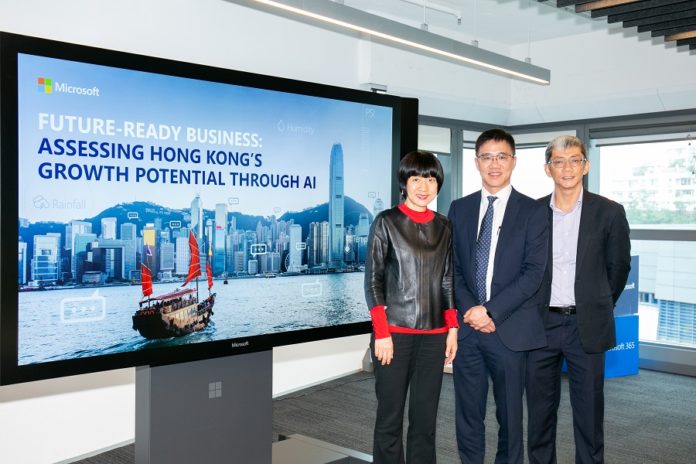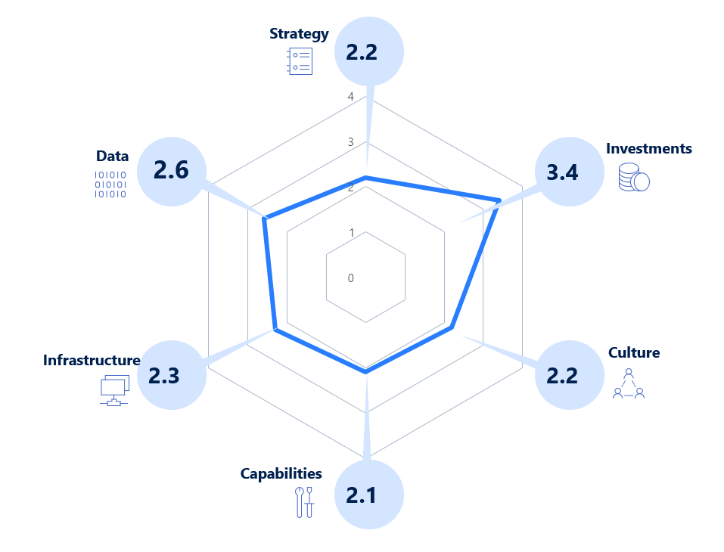
Hong Kong businesses have a lot of high hopes about artificial intelligence (AI) technology, and are investing quite a bit in the technology compared to the rest of Asia, but most enterprises in the city currently lack the skillsets and the organizational culture to truly reap the benefits of AI.
So says a survey conducted by analyst firm IDC and commissioned by Microsoft. The study – which covers 15 markets in Asia-Pacific – was first released in February 2019, but Microsoft convened a press event on May 8 in Hong Kong to break out the local results from the survey.
According to those results, 74% of management level respondents agreed that AI is instrumental for their organization’s competitiveness, and fully expect AI to boost their rates of both innovation and employee productivity improvements by 2.3 times in 2021.
For respondents that have already started adopting AI tech (around 40%), they’re expecting AI to increase their competitiveness by 2.6 times in 2021.
The top drivers for adopting AI include higher margins (30%), higher competitiveness (28%) accelerated innovation (13%) more productive employees (13%) and business intelligence (8%).
That’s the good news. The not-so-good news is that for the most part, in terms of “AI readiness”, Hong Kong isn’t really leading the charge in the Asia-Pacific region – although, to be fair, Asia-Pacific overall doesn’t rate all that high on AI readiness, either.
To explain: IDC rates “AI readiness” of an enterprise or market by weighing six dimensions:
- Strategy (the degree to which AI is core to their strategy)
- Investment (in terms of the amount, if that amount increases every year, and how organization-wide is that investment)
- Culture (swapping top-down decisions, risk aversion and rigid silos for bottom-up, flexible and collaborative culture)
- Capabilities (cloud, organization-wide data estate, AI-based analytics, etc)
- Infrastructure (swapping standalone data centers for an enterprise data estate that all business users can access)
- Data (siloed data vs data available to all employees across different departments).
The earlier study shows that Asia-Pacific overall rates better with culture (2.47 out of 4.0), investment (2.43) and data (2.35). But it doesn’t do so well with strategy, capabilities and infrastructure.
To put those scores in context, Asia-Pacific enterprises that are considered leaders in AI readiness (and these only account for 6% of the enterprises surveyed) register scores ranging from 2.9 (culture) to 3.7 (strategy).
By contrast, Hong Kong enterprises are investing considerably more in AI (with a score of 3.4) compared to the regional average, and is slightly ahead on data liberation, but where it really lags is corporate culture.

AI Readiness in Hong Kong (Scale of 0.00 – 4.00)
Most respondents agreed that employees are not empowered to take risks or make decisions autonomously, proactive innovation and cross-department collaboration are not encouraged, and employees generally don’t take on tasks outside of their job description.
Potentially more interesting – and perhaps telling – is the fact that management often seems to be less aware of this than the workers themselves. Employees were more likely to agree with the above points than managers, especially in terms of cross-department collaboration (whether horizontal or vertical) – 70% of employees said this was not happening in their business, but 70% of managers surveyed said that it is.

Cultural Traits in an Organization to Support AI Journeys
“Overall, workers in Hong Kong are more skeptical than the management about the cultural readiness of their organizations,” said Victor Lim, VP of Customer Research and Consulting Operations at IDC Asia/Pacific.
According to the survey, the basic barriers to AI adoption in Hong Kong come down to three things: lack of skills and resources, lack of thought leadership and commitment, and lack of advanced analytics tools and infrastructure.
The question of skillsets gets more complicated when you start looking at how demand for skillsets will shift over the next few years, because the rise of AI isn’t expected to eliminate most jobs so much as either alter existing jobs or create all-new jobs, said Cally Chan, general manager of Microsoft Hong Kong and Macau.
“The jobs of today will not be the jobs of tomorrow, and we have already seen demand for software engineering roles expand rapidly beyond just the tech sector. However, building an AI-ready workforce does not necessarily mean an acute need for technological skills,” she said.
The survey says management expects adaptability/continuous learning, digital skills and analytical/statistical skills to be the top skillsets workers will need in the future. However, the survey cautions that management-level respondents value soft skills more than workers expect, which means there may not be enough workers to satisfy demand for the first two categories, and not enough jobs for workers with skills in the third category.
The good news is that most Hong Kong enterprises are willing to invest in human capital to beef up their employees’ AI readiness. The bad news: the majority of them don’t have a concrete plan for doing so.
“It is heartening to see that 87% of businesses prioritize skilling and reskilling of workers in the future. They plan to invest as much, or even more, in human capital than in new technology,” said Chan. “Even so, 73% of business leaders have yet to implement plans to help their employees’ to acquire the right skills, which is worrying in today’s context. They must have the urgency to support the fundamental shift in training workers for the future.”
The survey also reveals that the key barriers for employees being reskilled and retrained for the AI future are lack of time and not knowing what courses they should take. There’s also a considerable difference of opinion between workers and managers on whose responsibility it is to provide reskilling opportunities and resources. Workers think it should be the responsibility of the government (76%), the company (67%) and related industry/trade associations (67%). Managers think it should be up to trade associations (69%), educational institutions (66%) and the government (65%).
All up, Chan says, Hong Kong enterprises need to focus on developing the right organizational culture to fully capitalize on the advantages and benefits of AI technology, and help the workforce train up the necessary digital skillsets.
How they do that is up to them, but Ted Suen, chief information officer of MTR Corp – which runs Hong Kong’s mass transit rail system but makes most of its money from property development – said his company has been building up its AI culture in the organization by collaborating with Microsoft to not only educate employees on what AI is and examples of its capabilities, but also stage internal AI hackathons to get employees to think up their own ideas for how they could use AI in their own departments, be it HR, operations procurement or finance.
“It helps the different departments understand that AI is not rocket science and only for the IT department,” Suen said at the Microsoft press event promoting the survey results. “They can also understand what AI is and how they could really apply it to different business areas, whether to address their business lead point or help them to improve their effectiveness and efficiency.”















